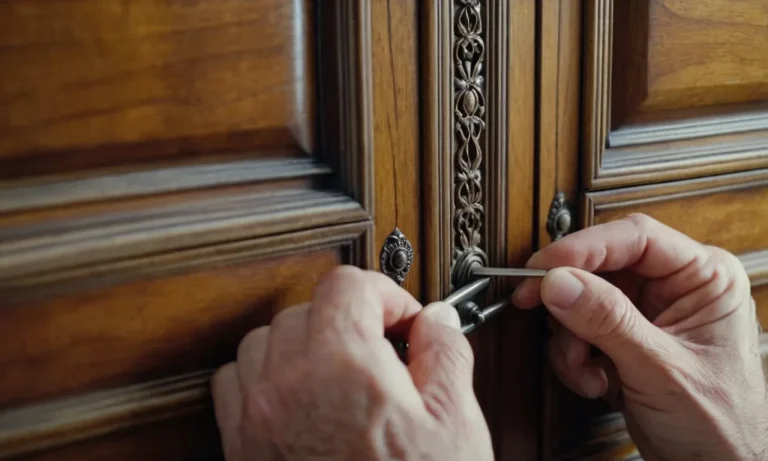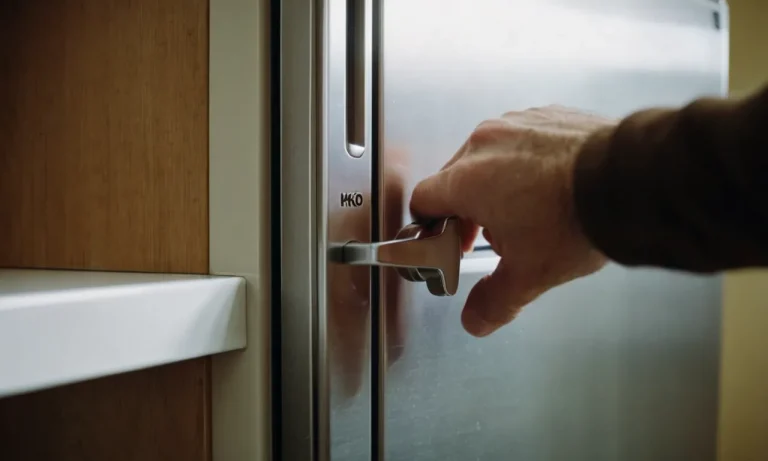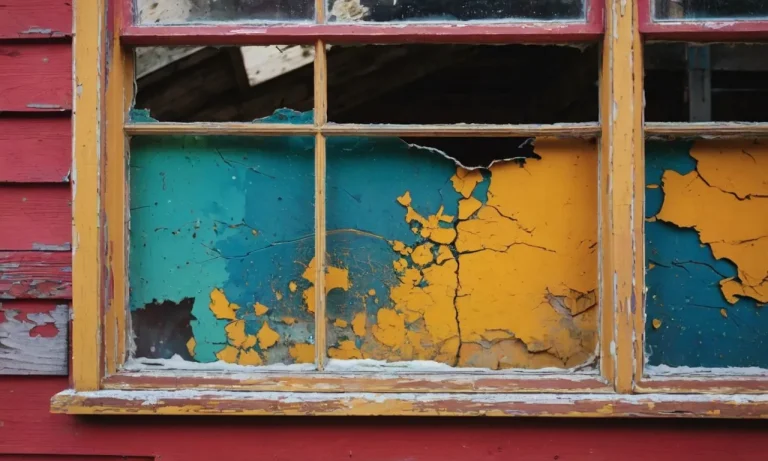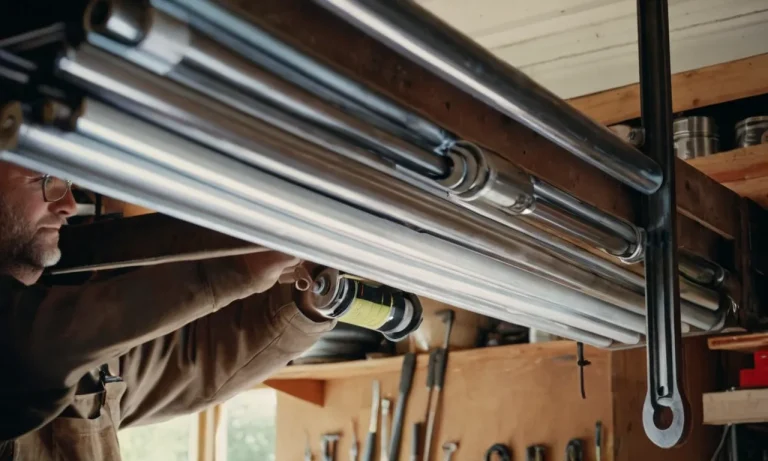Why Your Garage Door Isn’T Closing All The Way And How To Fix It
Is your garage door not closing completely, leaving a gap at the bottom? A garage door that won’t close all the way can be frustrating and pose security risks. Fortunately, there are several easy things you can try yourself to get your stubborn garage door closing properly again.
If you’re short on time, here’s a quick answer to your question: Worn or loose garage door cables, broken springs, misaligned tracks, and obstructions are common causes of garage doors not closing fully.
Adjusting cables, replacing springs, realigning tracks, and clearing obstructions can often resolve the issue.
Check for Obstructions
One of the most common reasons why a garage door isn’t closing all the way is due to obstructions. Before you panic and call a professional, take a few minutes to inspect the area around your garage door for any potential obstacles.
Inside the Garage
Start by checking inside the garage. Look for any objects that may be blocking the path of the garage door. Common culprits include storage boxes, bikes, or even tools that have been left in the way. Make sure to clear away any obstructions and try closing the door again.
If you have a garage door opener, check to see if anything is obstructing the sensors. These sensors are located near the bottom of the garage door tracks and are designed to detect any objects or people in the way. If the sensors are blocked, the door won’t close properly.
Clear any debris or spider webs that may be interfering with the sensors and test the door again.
On the Outside
Next, step outside and examine the area around your garage door from the outside. Look for any objects such as branches, leaves, or even trash cans that may be preventing the door from closing all the way. Clear away any debris and try closing the door again.
It’s also a good idea to check if the weatherstripping along the bottom of the garage door is damaged or worn out. This can prevent the door from closing properly. If you notice any issues with the weatherstripping, it may need to be replaced.
Remember, safety should always be a top priority when working with your garage door. If you’re unsure about how to clear an obstruction or if you suspect there may be a more serious issue causing your garage door to not close properly, it’s best to seek professional help.
A trained technician will have the expertise and knowledge to diagnose and fix the problem safely and efficiently.
Inspect the Tracks
One common reason why your garage door isn’t closing all the way is due to issues with the tracks. Over time, the tracks can become misaligned or damaged, preventing the door from closing properly. To inspect the tracks, start by visually examining them for any visible signs of damage such as dents or bends.
If you notice any issues, you may need to replace the damaged track sections. Additionally, check for any obstructions in the tracks, such as dirt or debris, which can also prevent the door from closing fully.
How to fix it:
If you find that the tracks are misaligned, you can try adjusting them yourself. First, make sure the garage door is fully open. Then, use a level to check the alignment of the tracks. If they are not level, you can loosen the screws or bolts holding the tracks in place and gently tap them back into position using a rubber mallet.
Once the tracks are aligned, tighten the screws or bolts to secure them in place. If you are unsure how to perform this task, it is recommended to contact a professional garage door repair service.
It’s also important to keep the tracks clean and free of debris. Use a soft cloth or brush to remove any dirt or obstructions that may be preventing the door from closing properly. Regular maintenance and cleaning of the tracks can help prevent future issues and ensure smooth operation of your garage door.
For more detailed instructions and visual demonstrations, you can visit Family Handyman’s website. They provide step-by-step guides and helpful tips for fixing various garage door problems, including issues with tracks.
Examine the Springs
When your garage door isn’t closing all the way, the first component to examine is the springs. These springs play a crucial role in the smooth operation of your garage door. There are two types of springs commonly used in garage doors: torsion springs and extension springs.
Torsion Springs
Torsion springs are typically mounted above the garage door and are responsible for lifting and lowering it. These springs store mechanical energy when they are twisted, and release it when the door is opened or closed.
Over time, torsion springs can wear out or break, causing the door to have difficulty closing all the way.
If you suspect that your torsion springs are the culprit behind your garage door not closing properly, it’s best to call a professional garage door technician to assess and replace them if necessary. Attempting to fix or replace torsion springs on your own can be dangerous, as they are under a significant amount of tension.
Extension Springs
Extension springs are typically mounted on both sides of the garage door, parallel to the horizontal tracks. These springs stretch and contract to provide the necessary force to raise and lower the door.
If one or both of the extension springs are damaged or worn out, it can cause the door to close unevenly or not close at all.
Inspect the extension springs for signs of wear, such as rust, fraying, or gaps. If you notice any damage, it’s important to replace them. However, it’s recommended to hire a professional garage door technician to handle the replacement, as extension springs can be dangerous to work with due to their high tension.
Pro Tip: Regular maintenance and inspection of your garage door springs can help prevent issues before they become major problems. Lubricating the springs and checking for signs of wear or damage can extend their lifespan and ensure your garage door operates smoothly.
If you want to learn more about garage door springs and how to maintain them, you can visit Garage Door Nation’s blog post on maintaining garage door springs. They provide comprehensive information and tips on garage door spring maintenance.
Check the Cables
One possible reason why your garage door isn’t closing all the way could be due to issues with the cables. The cables play a crucial role in the operation of the door, as they help to lift and lower it.
Over time, cables can become loose, frayed, or even break, preventing the door from closing properly. If you notice any visible damage or signs of wear on the cables, it’s important to address the issue as soon as possible.
One way to check the cables is to visually inspect them. Look for any signs of fraying, rust, or other damage. If you notice any issues, it’s best to call a professional garage door repair company to assess the situation.
Attempting to fix the cables yourself can be dangerous and may result in further damage or injury.
In some cases, the issue with the cables may be that they have simply come off the pulleys or drums. This can cause the door to become misaligned and prevent it from closing properly. If you feel comfortable doing so, you can try to carefully reposition the cables onto the pulleys or drums.
However, it’s important to exercise caution and consult a professional if you’re unsure.
If the cables are damaged beyond repair, they will need to be replaced. This is not a task that should be attempted by someone without experience or knowledge in garage door repair. A professional technician will have the necessary tools and expertise to safely replace the cables and ensure that your garage door is functioning properly.
Remember, the cables are an integral part of your garage door’s operation. Regular maintenance and inspections can help to identify any issues before they become major problems. If you’re experiencing problems with your garage door not closing all the way, it’s best to consult a professional to diagnose and fix the issue.
Adjust the Opener Settings
If your garage door isn’t closing all the way, one of the first things you should check is the opener settings. The opener settings control how far the garage door travels when it opens and closes. Sometimes, these settings can get out of alignment, causing the door to stop short of closing fully.
1. Check the Close Limit Switch
The close limit switch is responsible for determining when the garage door is fully closed. If this switch is set too high, it may prevent the door from closing all the way. To adjust the close limit switch, locate the adjustment screw on the opener.
Turn the screw in small increments until the door closes properly.
2. Test the Safety Sensors
Most modern garage doors are equipped with safety sensors that prevent the door from closing if there is an obstruction in its path. If these sensors are not aligned properly or if there is an issue with the wiring, the door may not close all the way. Start by checking the alignment of the sensors.
Make sure they are facing each other and that there are no obstructions blocking the beam. If the sensors are properly aligned, check the wiring for any signs of damage. If necessary, consult the manufacturer’s instructions for troubleshooting steps specific to your model.
3. Consult the Opener’s Manual
If adjusting the opener settings doesn’t solve the problem, consult the opener’s manual for further guidance. The manual will provide detailed instructions on how to adjust the settings specific to your opener model. It may also include troubleshooting tips for common issues.
Remember, safety should always be your top priority when working with garage door openers. If you are unsure about any of the steps or if the problem persists, it is best to consult a professional garage door technician.
For more information on adjusting garage door opener settings, you can visit the LiftMaster website. They provide comprehensive resources and support for their products.
When to Call a Professional
While many garage door issues can be fixed with a simple DIY approach, there are certain situations where it is best to call a professional. Here are a few instances where it is recommended to seek the expertise of a garage door technician:
Complex Repairs
If your garage door problem involves complex repairs, such as issues with the motor or the springs, it is advisable to call a professional. These components can be dangerous to work with if you don’t have the necessary knowledge and experience.
A professional technician will have the expertise to handle these repairs safely and efficiently.
Electrical Problems
If you suspect that your garage door issue is related to electrical problems, it is best to leave it to the professionals. Dealing with electrical components can be hazardous, especially if you are not familiar with the wiring and circuitry involved.
A professional technician will have the necessary skills and tools to diagnose and fix any electrical problems that may be causing your garage door to malfunction.
Safety Concerns
If your garage door poses safety concerns, such as not closing all the way or reversing unexpectedly, it is important to seek professional help. These issues can be a sign of a malfunctioning safety sensor or other critical components.
A professional technician will be able to assess the situation and ensure that your garage door is functioning safely and properly.
Warranty Coverage
If your garage door is still under warranty, it is recommended to call a professional for repairs. Attempting to fix the problem yourself may void the warranty, leaving you responsible for any future repairs or replacements.
A professional technician will have the knowledge and expertise to properly address the issue without compromising any warranty coverage.
Remember, while DIY repairs can save you money, there are certain situations where it is best to call a professional. By doing so, you can ensure that your garage door is fixed correctly and safely, giving you peace of mind and avoiding any potential further damage or accidents.
Conclusion
A garage door that doesn’t fully close can be a nuisance, safety hazard, and invitation to intruders. In most cases, DIY troubleshooting and adjustments can get your garage door closing correctly again.
But if adjusting cables, springs, opener settings, and tracks doesn’t do the trick, it’s best to call a professional garage door technician for repairs.







